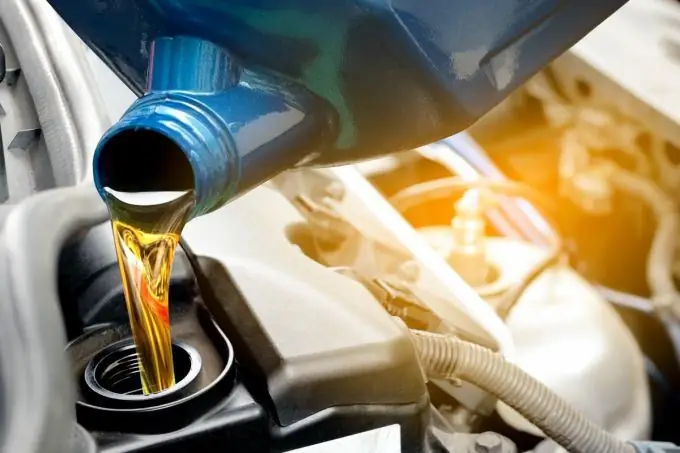- Author Maria Gibbs gibbs@autolifeadvice.com.
- Public 2023-12-16 03:05.
- Last modified 2025-01-22 17:48.
The use of high quality engine oil is considered essential to ensure proper engine performance. The grease loses its operational properties depending on a number of reasons, after which it requires urgent replacement.

The main characteristics of the new quality oil are a pronounced oily odor and a transparent golden color. Changes in odor and color occur with prolonged use of the lubricant. In this case, the smallest foreign particles, including soot and steel shavings, can be observed in it. Replacement of modern lubricants is required after a run of 8-10 thousand km, since after such a distance they lose their performance characteristics. This helps to avoid further damage to the engine.
The smell of sulfur in the oil prevents the penetration of exhaust gases into the chamber. This indicates a punctured valve cover gasket. The owner of the car is forced to open the motor in order to diagnose and replace leaky insulators. The oil contains the correct additives to neutralize sulfur. In the future, this chemistry loses its properties, which leads to the appearance of a sugary smell of sulfur. Then the car owner needs to change the oil or perform more detailed diagnostics of the engine.
Possible problems with engine lubrication
Burning grease can be noticed when using oil of dubious quality or dynamic driving. In this case, the grease has a characteristic burning smell. This can also be seen if there is a malfunction of the cooling system in the car. Dried oil does not protect the engine from increased wear. It does not provide adequate lubrication for moving parts. Therefore, it is not recommended for use.
Usually, the sour unpleasant smell of grease or the so-called oxidation of oil is fixed closer to 8-10 thousand kilometers. A chemical reaction occurs among engine oil and exhaust gases, fuel and combustion products. During oxidation, the oil loses its quality, so it is assumed that it needs to be changed urgently. If you ignore this point, you can bring the engine to major breakdowns and premature wear, which will entail expensive repairs.
The main sign that side fluids, including antifreeze, have got into the engine, as well as that the oil is contaminated with all kinds of microorganisms, is the appearance of an unpleasant, pungent odor in the lubricant. Often, the spread of bacteria provokes the appearance of rust. The owner will have to make expensive repairs in order to reanimate the car's engine until it is fully restored.
Appropriate and timely service
Basically, no problems with lubrication are noted if the car owner regularly maintains the engine, uses oil of the proper quality, which is recommended by the manufacturer, and does this constantly every 8 thousand kilometers. If, with such constant maintenance, the oil still has an unpleasant odor, this means that the motor has major malfunctions, it needs diagnostics and repairs.
The car owner will need not only to change the oil with a new one in time, but also to monitor its level and condition each time. It is necessary to sniff the oil more often, in which various side odors should not appear. It will not be superfluous to measure the lubrication level with a dipstick on a cold engine once a month.






